Artificial Intelligence (AI) is revolutionising the education sector by enhancing both learning and teaching experiences. AI’s ability to personalise learning paths, automate routine tasks, and provide real-time feedback is making education more efficient and accessible. Through adaptive learning systems, AI tailors educational content to individual student needs, fostering better engagement and understanding. Additionally, AI supports teachers by offering insights into student performance, allowing for more targeted and effective teaching strategies.
While the benefits of AI in education are immense, it is essential to address challenges such as data privacy and equitable access to ensure all students can benefit from these technological advancements. Discover how AI is shaping the future of education.
What is AI?
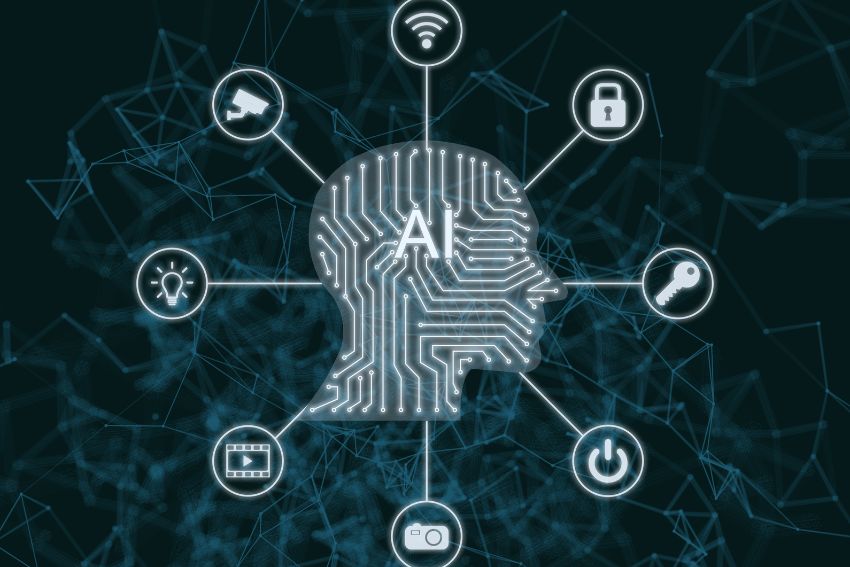
AI refers to the simulation of human intelligence processes by machines, especially computer systems. These processes include learning (the acquisition of information and rules for using the information), reasoning (using rules to reach approximate or definite conclusions), and self-correction. Moreover, AI can be categorised into two types: narrow AI and general AI.
- Narrow AI – designed to perform a narrow task (e.g., facial recognition or internet searches). Most of the AI applications in use today fall under this category.
- General AI – capable of performing any intellectual task that a human can do. General AI is still theoretical and not yet in existence.
History of AI
- 1950s – The concept of AI was officially introduced by John McCarthy, Marvin Minsky, Nathaniel Rochester, and Claude Shannon during the Dartmouth Conference. The term “artificial intelligence” was coined.
- 1960s-70s – AI research focused on problem-solving and symbolic methods. Early AI programs could solve algebra problems, prove theorems in geometry, and play games like checkers.
- 1980s – The advent of machine learning, where computers started learning from data, marked significant progress. Consequently, expert systems, which mimic the decision-making abilities of a human expert, became popular.
- 2000s – With advancements in computational power and data storage, AI research and applications gained momentum. Consequently, AI technologies like natural language processing (NLP), robotics, and computer vision saw significant development.
- 2010s-Present – AI has become mainstream, with applications in various fields including education, healthcare, finance, and transportation. Technologies such as deep learning, neural networks, and AI-powered assistants have become integral to many industries.
Key Components of AI
- Machine Learning (ML) – Enables systems to learn and improve from experience without being explicitly programmed.
- Natural Language Processing (NLP) – Allows machines to understand, interpret, and respond to human language.
- Computer Vision – Enables machines to interpret and make decisions based on visual data.
- Robotics – Involves the design and use of robots for various tasks, including education.
AI in Education
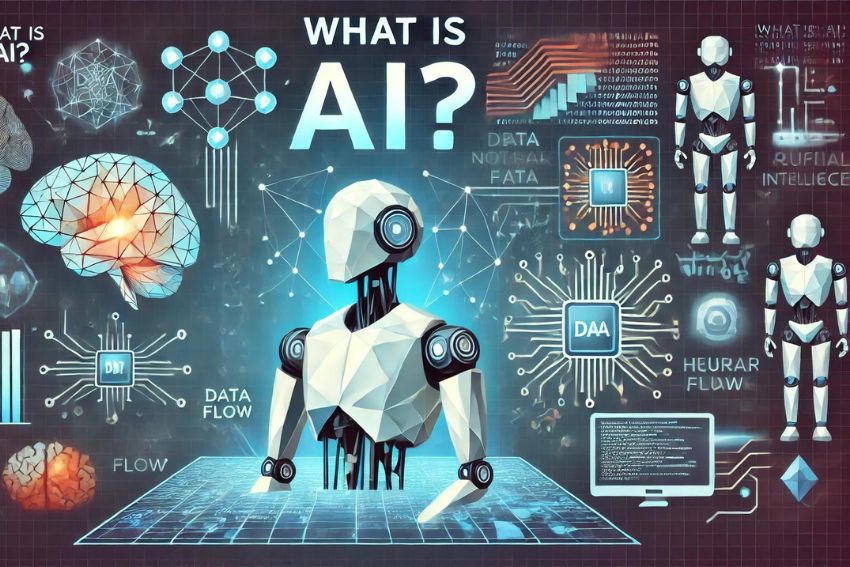
Artificial intelligence has already started changing the education sector, among other areas, in current times by bringing new ways of teaching and learning. Consequently, with AI, teachers will be able to develop individualised learning experiences more effectively, carry out administrative work efficiently, and, moreover, enable their students better.
On this note, AI-driven tools, ranging from adaptive learning platforms to intelligent tutoring systems, are transforming the traditional ways of education into an interactive, efficient, and accessible learning process. Furthermore, the blog explains how AI integrates into education in various ways, highlighting its potential to transform the learning environment into a dynamic and inclusive space.
Personalised Learning in AI – Customising Education for Each Student’s Needs
The dawn of Artificial Intelligence has been a game changer in many industries, not excluding education. One of the most futuristic applications of AI in education is personalising learning. Indeed, this approach uses AI technologies to make learner experiences customised to each student based on their needs, strengths, and pace in learning. Moreover, this detailed exploration looks into how AI facilitates personalised learning, its benefits, challenges, and future prospects.
How AI Facilitates Personalised Learning
Adaptive Learning Systems – AI-powered adaptive learning systems adjust content delivery based on the student’s performance and learning style. These systems analyse data such as quiz results, response times, and interaction patterns to tailor educational materials in real time.
Intelligent Tutoring Systems – Intelligent tutoring systems (ITS) use AI to provide one-on-one instruction, effectively mimicking the benefits of personal tutors. Furthermore, these systems can offer detailed explanations, answer questions, and provide instant feedback. Additionally, they adapt to the learner’s progress and areas of difficulty, ensuring a tailored educational experience.
Predictive Analytics – By analysing vast amounts of data, AI can predict which areas a student is likely to struggle with and pre-emptively provide resources or interventions. This proactive approach helps in mitigating learning gaps before they widen.
Natural Language Processing (NLP) – NLP enables AI to understand and respond to student queries in natural language, making learning more interactive and engaging. It also helps in developing tools like essay graders and chatbots that assist with writing and comprehension tasks.
Personalised Content Recommendations – AI algorithms can recommend learning resources such as videos, articles, and exercises tailored to the student’s interests and proficiency level. This approach engages and challenges students appropriately.
Challenges and Considerations
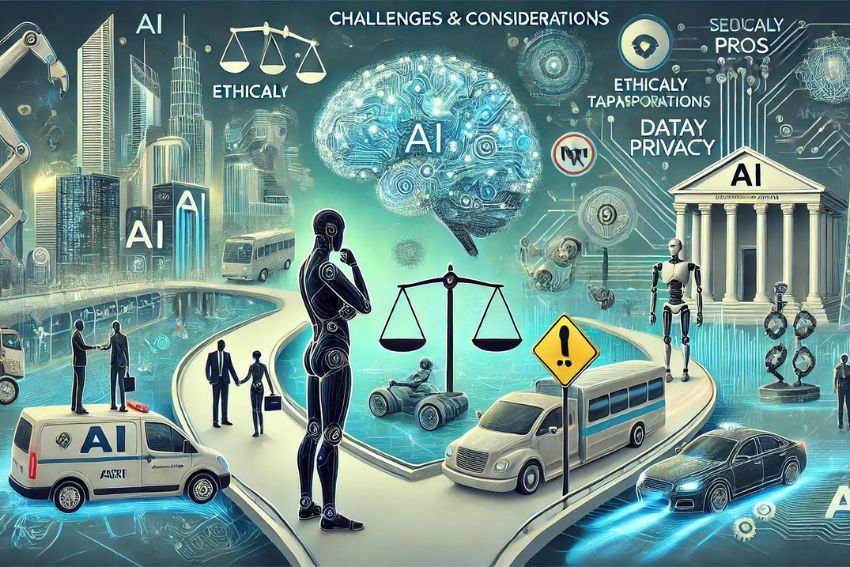
Data Privacy and Security – The use of AI in personalised learning involves the collection and analysis of vast amounts of student data. Therefore, ensuring the privacy and security of this data is paramount to protect students’ rights and maintain trust.
Bias and Fairness – AI systems can perpetuate or even exacerbate biases present in the data they are trained on. Consequently, it is essential to develop and implement algorithms that are fair and unbiased to ensure equitable educational opportunities for all students. Moreover, by addressing these biases, we can create a more inclusive learning environment. Furthermore, ongoing monitoring and adjustment of these algorithms are necessary to maintain fairness as new data is introduced.
Teacher Training and Support – Educators need to understand how to integrate AI tools into their teaching practices and how to interpret the data provided by these systems.
Technological Infrastructure – Reliable access to technology ensures students can benefit from AI-powered personalised learning. Ensuring that all students have access to the necessary devices and internet connectivity is a significant challenge, particularly in underserved regions.
Ethical Considerations – The use of AI in education raises several ethical questions, including the extent of AI’s role in decision-making and the potential impact on student autonomy. It is crucial to address these ethical concerns to ensure that AI serves as a tool to enhance, rather than replace, human educators.
Future Prospects
The future of personalised learning in AI holds immense potential. Advances in AI technologies, such as machine learning, NLP, and computer vision, will continue to enhance the capabilities of personalised learning systems. As these technologies evolve, we can expect even more sophisticated and intuitive learning experiences.
- Integration with Virtual and Augmented Reality – The combination of AI with virtual and augmented reality (VR/AR) undoubtedly can create immersive learning environments tailored to individual needs. Furthermore, these technologies can provide hands-on experiences and simulations that significantly enhance understanding and retention.
- Greater Collaboration – AI can facilitate collaboration among students by forming study groups based on complementary skills and learning needs. Consequently, this peer-to-peer learning can be a powerful supplement to personalised instruction.
- Continuous Improvement – AI systems continuously learn from their interactions with students, leading to ongoing improvements in personalised learning. This iterative process ensures that educational tools become more effective over time.
- Scalability – AI-powered personalised learning scales to accommodate large numbers of students, delivering high-quality, customised education on a global scale.
In conclusion, personalised learning in AI represents a transformative approach to education, offering numerous benefits while also posing significant challenges. By addressing these challenges and leveraging the full potential of AI, we can create a more inclusive, engaging, and effective educational landscape that meets the needs of every student.
Automated Grading and Feedback
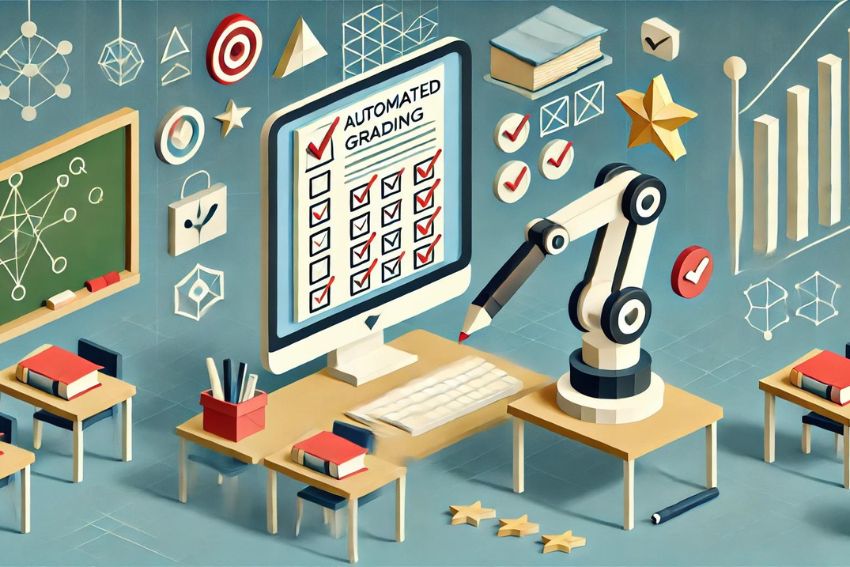
A significant advancement in the field of education is the advent of automated grading and feedback systems. Not only are these systems designed to alleviate the administrative burden on educators, but they also enhance the efficiency of grading and provide timely, personalised feedback to students. In this detailed exploration, we will delve into how automated grading and feedback streamline administrative tasks, the benefits they bring to the educational process, and the challenges that accompany their implementation.
The Evolution of Automated Grading
Automated grading systems have evolved considerably from simple multiple-choice scanners to sophisticated algorithms capable of evaluating complex written responses. Early iterations primarily used objective assessments, focusing on multiple-choice questions.
However, advancements in artificial intelligence (AI) and machine learning (ML) have enabled the development of systems that can analyse and grade essays, short answers, and even project-based assessments. These systems utilise natural language processing (NLP) to understand context, grammar, and content, allowing for a more comprehensive evaluation of student work.
Streamlining Administrative Tasks
One of the most significant advantages of automated grading is the reduction in time and effort required for marking. Traditional grading is often a time-consuming process, particularly for large classes or courses with frequent assessments. Automated systems can process hundreds of submissions in a fraction of the time it takes a human grader, freeing up educators to focus on other essential tasks such as lesson planning, student engagement, and professional development.
Additionally, automated grading systems can maintain consistency and objectivity in evaluation. Human graders, despite their best efforts, often experience influences from various factors such as fatigue, bias, and subjectivity. Automated systems, on the other hand, apply the same criteria uniformly across all submissions, ensuring fair and unbiased grading. This consistency is particularly beneficial in large-scale assessments where maintaining standardisation is critical.
Automated grading and feedback systems contribute to this sea change in two ways. Firstly, they enable the freeing up of the administrative workload in education. Secondly, by reducing the time and effort required for marking, these systems allow educators much more time to apply impactful teaching practices. In that direction, the immediate feedback that automated systems can provide sharpens student experiences, leading to a more dynamic and responsive learning environment.
Challenges do exist, but the continued development and fine-tuning of these technologies signify a future where complete actualization of potential benefits from automated grading can significantly alter the education landscape for the better.
Top 5 UK Educational Platforms Using AI
1. Sparx
AI-driven platform designed to support maths learning for students at the GCSE level. It provides personalised learning experiences by adapting to each student’s progress and needs, offering practice problems and instant feedback to help improve their skills and understanding.
Sparx Learning utilises AI tools, ensuring full GDPR compliance and extensive privacy and security evaluations. Currently, AI supports three main activities:
Categorising Teacher Support Tickets
- AI summarises and categorises teacher support tickets for efficient analysis, such as log-in or set-up queries.
- Data is shared through a secure API.
- Sparx Learning data is not used for training third-party AI models.
- Outputs are evaluated for accuracy and reviewed by staff.
Marking Written Answers in Sparx Science
- AI automatically marks free-form written answers in Sparx Science, providing immediate feedback without sharing student personal data.
- Large language models understand nuanced language, awarding marks even with varied phrasing or minor errors.
- This approach promotes memory retrieval and improves writing skills.
In-Context Definitions in Sparx Reader
- AI interprets sentences to provide contextual definitions for words selected by students in Sparx Reader, enhancing comprehension without sharing student data.
2. Century Tech
Century uses AI to personalise education by understanding students’ strengths, weaknesses, and behaviours more efficiently than humans. Teachers often manage hundreds of students, making personalisation challenging. AI provides data to tailor education to individual needs, enhancing learning.
True AI vs. False Claims
Not all products claiming to use AI genuinely do. Century uses advanced machine learning algorithms, processing vast amounts of data to make autonomous decisions and recommendations.
Continuous Improvement
Century’s AI, refined over years and tested by thousands of students, continuously improves. Moreover, our evolving AI incorporates natural language processing and collaborates with academics to stay at the forefront of educational technology.
Human Element
Despite technological advancements, Century values the human element. Our team ensures AI supports teachers by automating tasks like marking and planning, allowing teachers to focus on building relationships and addressing student needs.
Century’s AI aims to enhance learning outcomes, expand teacher capabilities, and elevate the educational experience.
3. Seneca Learning
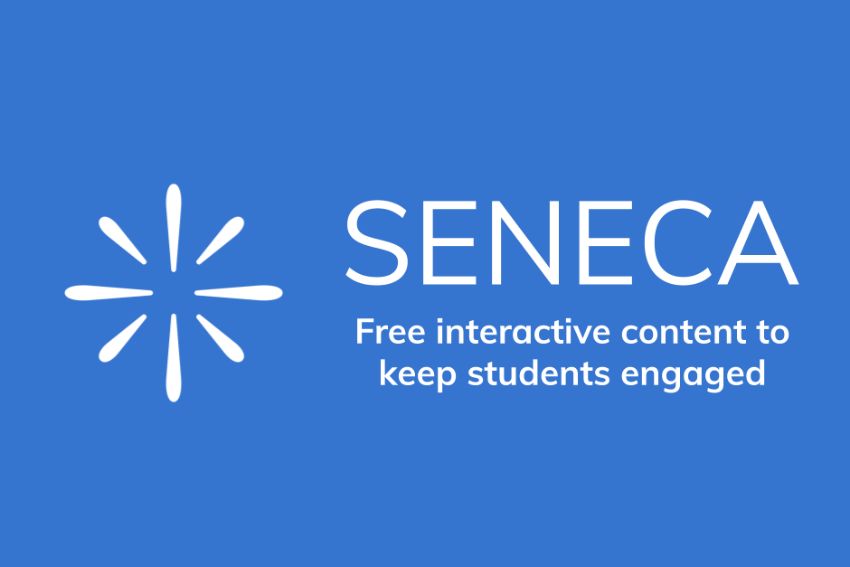
AI-driven Smart Learning Mode optimises your study schedule by telling you what to learn and when. Using insights from cognitive neuroscience and AI, it analyses your study data to recommend specific sections to focus on, enhancing your progress in any subject.
Unlimited AI-Marked Exam Questions
Gain access to thousands of AI-marked, free-text exam questions crafted by examiners and teachers. Furthermore, with our Exam Boost package, you can practice unlimited exam-style questions, which are automatically marked, ensuring you are thoroughly prepared for your exams.
Personalised Mini Mock Exams
Take mini mock exams tailored to your study history and needs, under timed conditions. Moreover, customise your exam with the hardest questions, previous wrong answers, calculation questions, and AI-marked sections for targeted practice.
Amelia AI Assistant
Boost your revision with Amelia, our AI-powered chatbot. Firstly, the Amelia AI Assistant package provides instant answers and personalises clarifications for any questions, tailored specifically to your year group. Moreover, this package includes all features of the Exam Boost. Additionally, the AI assistance elevates your understanding and revision efficiency.
Exam Boost Package
The Exam Boost package offers unlimited access to premium courses, advanced learning modes, quiz mode, AI-marked exam questions, and personalised mini mock exams. Moreover, this package is designed to maximise your study efforts and help you achieve top grades.
Integrate Artificial Intelligence into the way you study with our platform for a more intelligent, tailored way to learn. Offerings will range from optimizing your study schedule to unlimited AI-marked exam questions and personalized mock exams—tailored tools designed to empower better progress toward success in your academic venture. With additional support given by Amelia AI Assistant, achieve driving understanding and revision efficiency so that learning becomes effective and engaging.
4. Educake
Educake integrates AI to enhance the educational experience by employing retrieval practice and spaced learning, crucial techniques for effective knowledge retention.
Personalised Revision with the Revision Wizard
The Revision Wizard tracks students’ progress and suggests tailored revision activities, guiding them through study guides and quizzes to address their specific needs.
Automatic Marking and Instant Feedback
Educake’s AI-driven automatic marking feature provides instant feedback to students, significantly reducing teachers’ workloads and allowing for quick assessment of student understanding.
Supporting Formative Assessments
The platform’s AI capabilities furthermore aid in creating evidence-based strategies for reinforcing student knowledge. In addition, it offers insights into performance, thereby enabling personalised instruction to meet specific student needs.
Streamlining the Educational Process
By automating quiz marking, tracking progress, and identifying learning gaps, Educake’s AI features streamline the educational process. Consequently, this makes it easier for teachers to manage assessments and, additionally, for students to engage in independent learning.
5. Edumentors
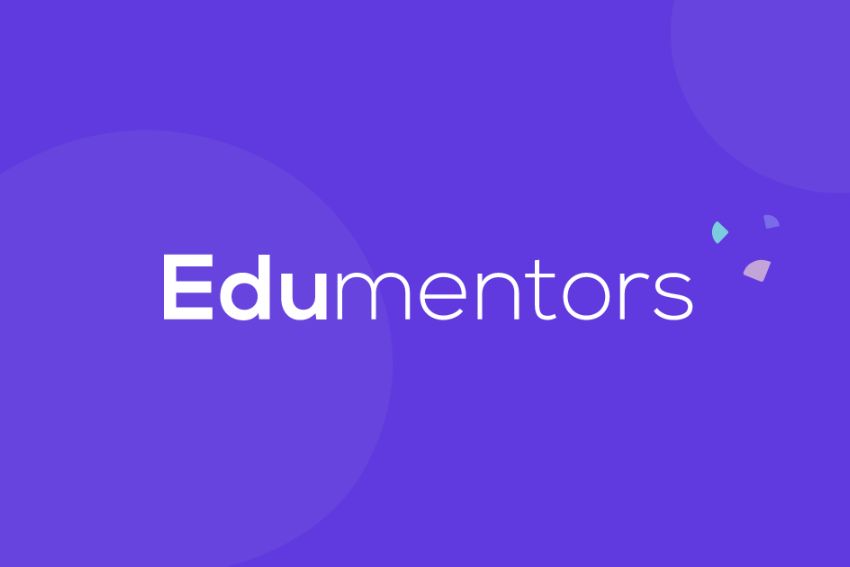
Edumentors is an online tutoring platform designed to bring students all over the world face-to-face with top-tier tutors who study at leading UK universities. Hence, the mission is to deliver a high-quality, bespoke education in order to respond to each student’s individual needs and learning goals. Edumentors harnesses cutting-edge technology by incorporating AI into the learning experience to drive effectiveness, engagement, and personalization.
MarkMyGCSE – Harnessing AI for Enhanced Assessment
t Edumentors, specifically, MarkMyGCSE deploys AI for detailed feedback and grading against GCSE assessments. Moreover, the accuracy and homogeneity of AI algorithms ensure accurate grading with reduced human error. Furthermore, broad feedback identifies class strengths and weaknesses, highlighting areas of modification while giving a student accurate learning.
By recognizing common errors or misconceptions, AI will enable targeted interventions. Personalized study materials will be recommended based on performance analysis by AI to suit individual student needs. ilha AI tracks the students’ progress, offering insights that enable adjustments in study plans that steer the student truly on course to achieve their academic goals.
Growth of AI in Education: Market Data and Analysis
AI speaks to the fundamentally changing way in which we are teaching and learning today, providing opportunities on a very personal level for both learning and administrative efficiency. The artificial intelligence market in education grew by an incredible amount in recent years, with a fast-growing adoption of AI technologies in education institutions and rising demands for customized learning experiences for students.
The global AI in the education market was pegged at roughly USD 1.1 billion in 2020 and is projected to grow at a CAGR of 40.3% from 2021 to 2028. By 2028, the market will more than reach USD 20 billion, indicating huge potential for AI to bring about change in learning.
Market Data and Analysis
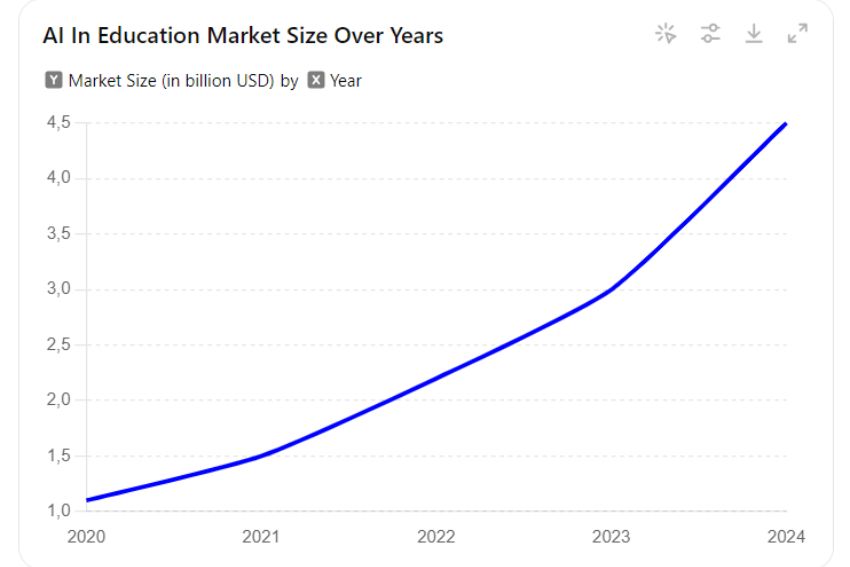
The AI in education market has experienced substantial growth from 2020 to 2024. In 2020, the market size was 1.1 billion USD, which increased to 1.5 billion USD in 2021, 2.2 billion USD in 2022, and 3.0 billion USD in 2023.
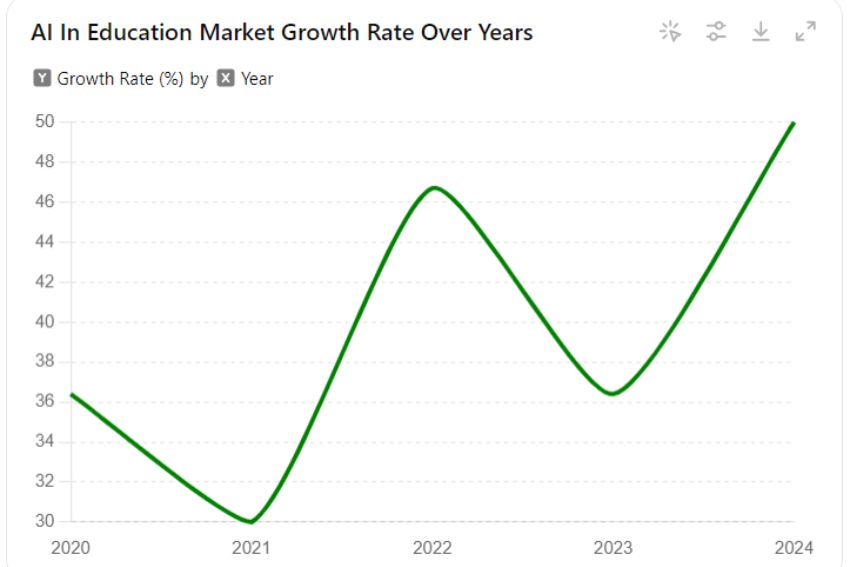
The AI in Education market is set for substantial growth, with the market size projected to reach 4.5 billion USD by 2024, reflecting a 50% growth rate.
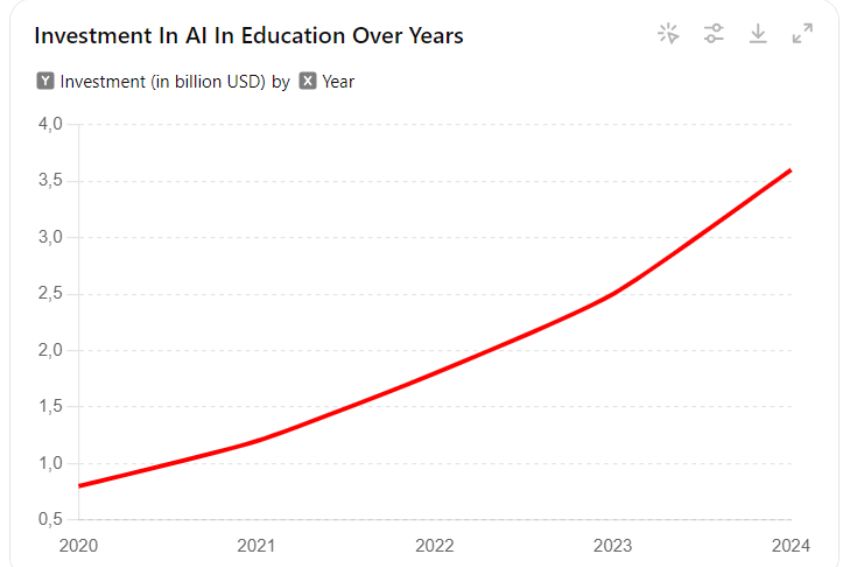
Investment in AI in education has seen a remarkable rise, starting from 0.8 billion USD in 2020 to a projected 3.6 billion USD by 2024.
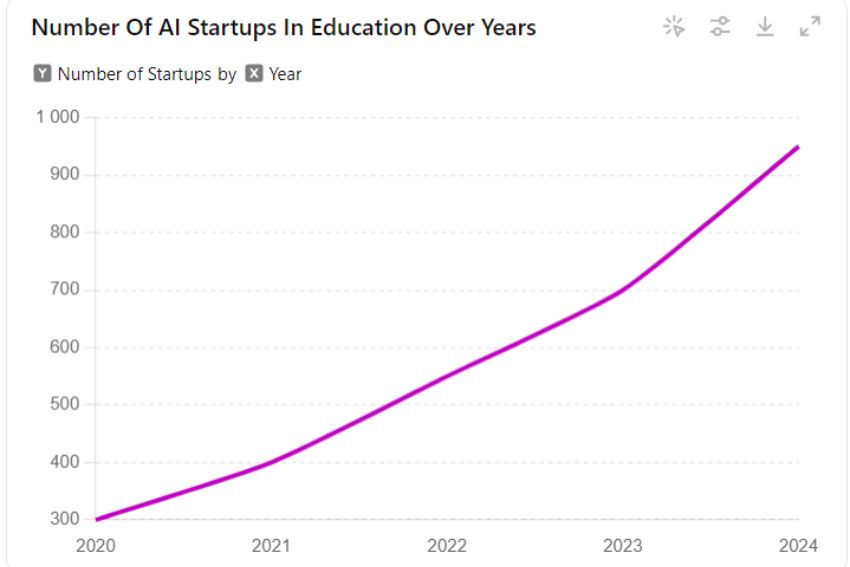
The number of AI startups in education has surged significantly from 300 in 2020 to a projected 950 in 2024.
AI In Education Market Statistics
| Year | Market Size (in billion USD) | Growth Rate (%) | Investment (in billion USD) | Number of Startups |
|---|---|---|---|---|
| 2020 | 1.1 | 36.4 | 0.8 | 300 |
| 2021 | 1.5 | 30 | 1.2 | 400 |
| 2022 | 2.2 | 46.7 | 1.8 | 550 |
| 2023 | 3 | 36.4 | 2.5 | 700 |
| 2024 | 4.5 | 50 | 3.6 | 950 |
Resourses: Grand View Research, MarketsandMarkets
Conclusion
AI in Education Revolutionizing Pedagogy and Learning Right from personalization in learning to games with the power of AI, automated grading, and predictive analytics, the education experience can be much more inclusive, engaging, and efficient with the help of AI. If we have to ensure that we all have equal access to this technology, overcoming ethical considerations will let us realize enhanced potential that AI has to offer in changing education for good. Embracing AI technologies can bring forth a dynamic, personalized, and inclusive learning environment that can ideally prepare students for today’s future.
If you need help with your subjects, Edumentors has a team of expert tutors ready to assist. Our tutors are from top UK universities and are equipped to provide personalised support in various subjects. Whether you’re struggling with a specific topic or need comprehensive guidance, hiring a private tutor from Edumentors can help you achieve your academic goals. Explore our platform to find the perfect tutor to meet your needs.








